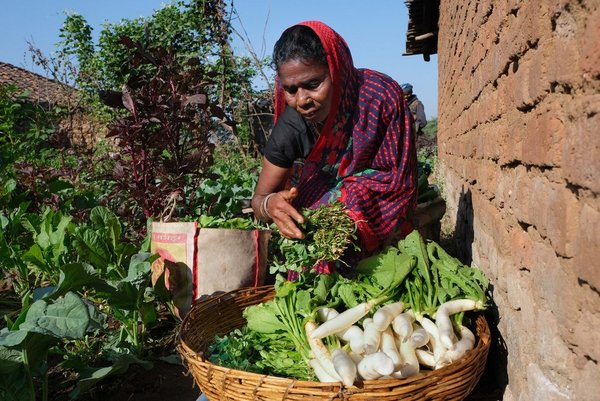- Share this article
- Subscribe to our newsletter
Special Initiative ‘ONE WORLD – No Hunger’ – Spotlight on India
Looking at progress on achieving the 17 SDGs, the Indian Voluntary National Review 2020 states that the challenges to achieve SDG 1, ‘No Poverty’, and SDG 2, ‘Zero Hunger’, have been exacerbated by the COVID-19 pandemic.
In India, the four programmes implemented by Deutsche Gesellschaft für Internationale Zusammenarbeit (GIZ) under the special initiative ‘ONE WORLD – No Hunger’ (SEWOH) launched by the German Federal Ministry for Economic Cooperation and Development (BMZ) are jointly working with implementing partners and local communities to strengthen rural livelihoods, increase resilience towards food and nutrition security and promote sustainable agriculture. How are they supporting the SDGs in India?
SEWOH contributions to SDGs 1 and 2
The SEWOH programmes in India are actively supporting the achievement of SDGs 1 and 2. The ‘Green Innovation Centre for the Agriculture and Food Sector’ (GIC) aims to increase the productivity and income of 139,000 smallholder farmers and sustainably improve regional food supply in the rural areas of the South Indian states of Maharashtra, Karnataka and Andhra Pradesh as well as Himachal Pradesh in the north of the country.
Since 2016, over 100,000 farmers have already been trained in good agricultural practices for tomato, potato, and apple cultivation. After applying recent innovations, these farmers were able to increase both their yields and income significantly.
In the provinces of Madhya Pradesh and Maharashtra, the global programme ‘Soil Protection and Rehabilitation of Degraded Soil for Food Security’ (ProSoil) promotes sustainable soil management practices and has so far reached 28,900 farmers, 46 per cent of whom are women. The ProSoil approach to soil fertility management led to an average productivity increase of 16 per cent in 2019.
Since 2018, ProSoil has been supporting home gardening activities by providing seeds, seedlings and water-saving measures for 3,364 households, as well as training on vegetable and horticultural cultivation, poultry and livestock housing, grey water use and soil fertility management.
The ‘Sustainability and Value Added in Agricultural Supply Chains for Cotton’ project currently supports around 150,000 smallholder cotton farmers in implementing sustainable agricultural practices. The most marginalised groups also receive support in coping with the consequences of the COVID-19 crisis, e.g. via the project’s backing the distribution of GMO-free seeds.
The fourth SEWOH project ‘Food and Nutrition Security, Enhanced Resilience’ (FaNS) contributes especially to SDGs 2 and 3 (Good Health and Well-Being) with diverse activities such as the participatory learning and action nutrition trainings (NPLA). Since 2016, 144,000 women in two districts of Madhya Pradesh have been trained on dietary diversity, young child feeding practices, nutrition gardening, use of local food and hygiene practices. With 20 piloted community nutrition gardens which are maintained by 255 women organised in self-help groups, year-round availability and access to vegetables for families has been increased, also during crises such as the COVID-19 pandemic.
Through the digitisation of the pan-India Public Distribution System, the project could also indirectly improve access to subsidised food grains for 54 million entitled people in Madhya Pradesh.
Which other SDGs does SEWOH contribute to in India?
Through its urban-rural nexus promotion of value chains for nutrients and carbon to improve soils in rural areas derived from organic urban waste, the programme addresses SDGs 11, ‘Sustainable cities and communities’, and 12, ‘Responsible consumption and production’. With the objective to protect 153,000 hectares of severely degraded soil used by smallholder farmers, ProSoil is investing in soil protection and rehabilitation that will directly contribute to SDG 15, ‘Life on Land’.
The GIC also supports SDG 5. In Andhra Pradesh, for example, it initiates exclusive women farmer groups that provide a special platform to take up joint initiatives. Furthermore, when agricultural machinery is being developed, GIC ensures that women are included in the development, testing and modification of technologies to increase agricultural productivity and yields.
To end poverty and achieve a world without hunger by 2030, efforts must be accelerated in a way that is compatible with our planetary boundaries. The current COVID-19 pandemic threatens progress and amplifies challenges in India, but at the same time provides an opportunity to rethink efficiency, effectiveness and resilience of interventions.
(giz/wi)
More information:
Soil Protection and Rehabilitation of Degraded Soil for Food Security
Green Innovation Centres
Sustainability and Value Added in the Cotton Economy
Food and Nutrition Security, Enhanced Resilience to Food Crises





Add a comment
Comments :